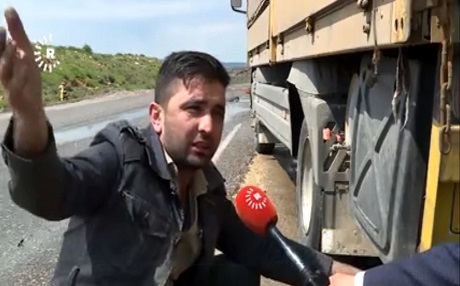"Poor road conditions" were the main reason of an accident on Friday that killed four people, Karwan Mohammed, the spokesperson of the Sulaimani Traffic Police told Rudaw, echoing a common sentiment.
Among those killed was Khanda Saeed Qadir, the sister of the former minister of Peshmerga Mustafa Saeed Qadir who is currently a potential candidate for Kurdistan Region vice president. Khanda Saeed’s daughter was also injured.
The seriousness of the accident which also injured five others went viral on social media with many lashing out at the government for not repairing highways. Others laid the blame on drivers for failing to comply with rules and regulations.
"We understand that the road conditions are extremely poor, but drivers should reduce their speed too," Aran Sabr commented on Rudaw’s Facebook page.
Behind natural causes, car accidents are the second-leading cause of death in the Kurdistan Region and on the rise. According to data collected by the Kurdistan Regional Government (KRG) Ministry of the Interior, 36,913 car accidents occurred from 2010 to 2018, killing 6,509 and injuring 77,362.
In the first five months of 2018, there were 1,577 car accidents, killing 235 people and injuring 2,508 more.
Rebaz Chelsea, an eyewitness on Friday, described the accident between a lorry and Land Cruiser as "very serious and terrifying.”
According to official data, in the first three months of 2019, 120 people were killed and 1,050 injured in 940 car accidents across the Kurdistan Region.
The Kurdistan Regional Government (KRG) has admitted that roads, especially outside cities, are in poor condition. An increase in the number of vehicles and bad road conditions has led to a rise in car accidents.
In 2010, the KRG prepared a 20-year master plan to convert all major roads into divided highways. The plan was held back by economic crises.
According to the master plan, nearly 1,000 kilometers of roadway in Kurdistan should have been divided by 2022.
A major problem for roads in the Kurdistan Region is lorries and tankers, which damage surfaces and create traffic.
“We have scales. We charge cargo trucks and give the money to finance ministry. Forty percent of the money would go to repairing the roads. These roads are constantly maintained. But they get damaged early. That is why we cannot repair all the roads with the revenue we make," Zana Mustafa Uzeri, the director general of Planning at the Ministry of Reconstruction, told Rudaw.
Separate roads for cargo trucks and large vehicles is a possible solution.
“We can widen the roads, but it is difficult to dedicate special roads for trucks under these conditions,” he said.
According to figures produced by the Transportation Directorate, there were more than 1,469,000 cars in the Kurdistan Region by the end of 2017, excluding military vehicles.
A truck driver was approached by Rudaw on the main Erbil-Koya road as he was trying to use his spare tire for his vehicle after the original one blew out hitting a giant hole.
A truck driver speaks with Rudaw while his tire was punctured in late-April 2019 on the main Erbil-Koya road.
"My tire has blown out. Please [government] have some mercy on us. My tire blew out after I hit a hole on the road and also the drive shaft broke," Mohammed Kaifi said, adding he was driving from Sulaimani to Erbil.
Following the federal takeover of Kirkuk, traffic has increased on smaller roads between the Kurdistan Region’s two largest cities of Erbil and Sulaimani.
Faris Mawlood, sitting on the passenger seat side, described the Erbil-Sulaimani road as "the road of death."
"Our government is asleep and does not want to wake up," he claimed.
Of 250 projects, the KRG Reconstructing and Housing Ministry says it has resumed working on 71.
"We continue our projects," Sami Qadir, the head of Follow-Up Department at the ministry, told Rudaw last week. He claimed there is now "serious attention" from the KRG to resume work at damaged roads.
An estimated 6,000 kilometers of roads connect the Kurdistan Region’s cities and towns. Of this number, only 650 kilometers are divided.
Sidqi Amedi, the KRG deputy minister of the Housing and Reconstruction, explained to Rudaw that up until 2003 "all the roads in Kurdistan were [designed to be] military roads."
Amedi admitted that "new roads made by the KRG do not meet international standards."
A large pothole can be seen on the main Erbil-Koya road in late-April 2019.
Hunar Tahir, a stage actor, recently lost friends in a serious car accident. Angered by the poor conditions of roads in the Kurdistan Region, he decided to protest by pouring mud over his head next to a main road.
“In Kurdish culture, putting mud on your head is the ultimate disillusionment and strongest protest against something. I poured a bowl of mud over my head in protest of the poor road conditions and the death of drivers and passengers. It was a protest for the government to pay attention to these roads so people no longer suffer,” Tahir told Rudaw.






Comments
Rudaw moderates all comments submitted on our website. We welcome comments which are relevant to the article and encourage further discussion about the issues that matter to you. We also welcome constructive criticism about Rudaw.
To be approved for publication, however, your comments must meet our community guidelines.
We will not tolerate the following: profanity, threats, personal attacks, vulgarity, abuse (such as sexism, racism, homophobia or xenophobia), or commercial or personal promotion.
Comments that do not meet our guidelines will be rejected. Comments are not edited – they are either approved or rejected.
Post a comment